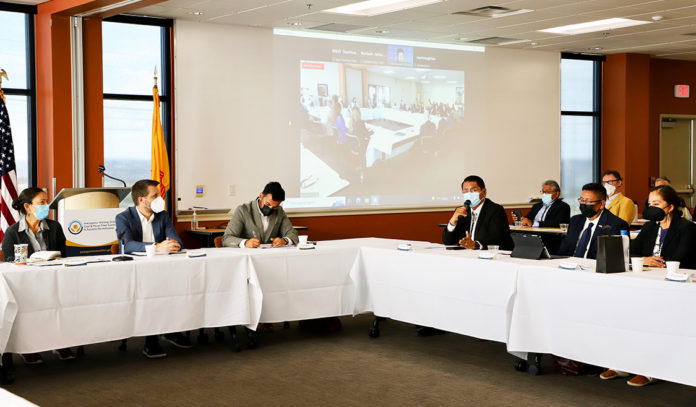
FARMINGTON, NM – Navajo Nation President Jonathan Nez yesterday met with U.S. Secretary of the Interior Deb Haaland, the White House’s Interagency Working Group on Coal and Power Plant Communities and Economic Revitalization, and other key stakeholders in Farmington, NM, during a roundtable discussion that focused on energy transition initiatives that support cleaner energy development, support for energy workers, and economic and community development opportunities in the Four Corners Region.
The Interagency Working Group on Coal and Power Plant Communities and Economic Revitalization was established through Executive Order 14008 signed by U.S. President Biden on Jan. 27, 2021, to support and revitalize the economies of coal and power plant communities. The initiative is co-chaired by the Director of the National Economic Council and the National Climate Advisor, and administered by the U.S. Secretary of Energy. The group has identified Four Corners as one of six regions in the nation identified as most vulnerable to further declines in coal-related employment.
“I appreciate the commitment of Secretary Haaland and the Biden-Harris administration to having a seat at the table for tribal nations,” said President Nez. “The Navajo Nation has been at the forefront of the energy transition initiatives in the Southwest with the closure of several power generating stations in our region. Through these discussions with our federal partners and others, we continue on the path to cleaner energy development and we have several solar facilities that are in operation and more that are being developed on the Navajo Nation. We look forward to continuing to work together on more energy initiatives that produce cleaner energy, jobs, and benefits for our communities.”
For many years, the Navajo Generating Station (NGS), Four Corners Power Plant, and San Juan Generating Station – all located within or near the Navajo Nation – provided thousands of good-paying jobs and provided a dependable source of revenue for the Navajo Nation, while using Navajo Nation resources to provide cities such as Phoenix and Tucson with low-cost electricity. The Navajo Nation has experienced significant financial losses due to the closure of the NGS power plant, ranging from $30-$50 million annually. In the next 10 years, the Four Corners Power Plant, the Cholla Power Plant and the San Juan Generating Station will also close.
In Arizona, President Nez has also been at the forefront of advocating for a just transition agreement that would provide $100 million to the Navajo Nation over 10 years to help address the effects of the closure of power plants, to provide economic recovery support, and support for renewable energy development. Key aspects of the agreement are now subject to approval by the Arizona Corporation Commission.
In 2019, the Navajo Nation adopted a climate adaptation plan that was developed by the Executive Branch in coordination with community leaders and representatives, and approved by the Naabik’íyáti Committee. The plan helps to identify and prioritize natural resources of concerns for communities, to establish timelines for action plans, and to allow for flexibility within the plan to adapt to the effects of climate change.
In previous discussions with federal officials, President Nez has highlighted the Navajo Nation’s ongoing work to reduce its carbon footprint by prioritizing renewable energy development and support for the New Mexico Energy Transition Act, which established new carbon emission standards to eliminate carbon emissions for energy production for the state by 2045.
“In 2019, we signed the Navajo Hayoołkaał Proclamation, which established a new vision and new standards focused on renewable energy development for the Navajo Nation,” added President Nez. “We have multiple solar facilities that are being developed and one that produces over 55 megawatts of electricity for homes in the western part of our Nation. The Navajo Nation is aggressively working on renewable energy projects in New Mexico, Utah, and Arizona.”
The Interagency Working Group on Coal and Power Plant Communities and Economic Revitalization also issued several announcements during the visit including the launch of a Rapid Response Team in the Four Corners Region and $600 million through the Bipartisan Infrastructure Law to help reclaim orphaned wells, and investments through the Inflation Reduction Act.














































